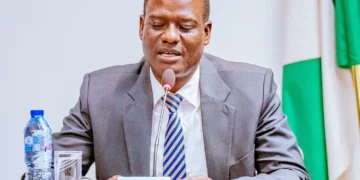The eleven electricity distribution companies (DisCos) in the country have they lost about N2.5billion in revenue to the one-day strike embarked on by members of the National Union of Electricity Employees (NUEE), last week Thursday.
The executive director of Research and Advocacy at the Association of Nigerian Distribution Companies (ANED), Sunday Oduntan, when made this claim while speaking on an Arise TV programme, also expressed worries that the action may weaken investors’ confidence and interest in the country’s power sector.
This is despite the DisCos, failure to fully pay for electricity allocated to them, which created a deficit of N66.85 billion in the Nigerian Electricity Supply Industry, (NESI), in the third quarter of 2021.
Recall that the electricity workers, during the one-day strike, shutdown the national grid down, thus plunging the nation into darkness.
The strike had crashed Nigeria’s power generation from a peak of 4,829.5 megawatts to as low as 43MW, data from the Federal Ministry of Power showed.
Latest figures on the national grid performance obtained yesterday indicated that the grid has since been stabilized as peak power generation stood at 4,414MW.
Oduntan said if the industrial action, which lasted less than a day, had persisted for one week, it would have been capable of bringing the entire power sector value chain to a total collapse.
He said the FG’s failure to address some of the concerns of the union, which NUEE said it had raised and notified them of the same since May this year, led to the strike.
He said there is a misalignment in the power sector value chain and challenged the federal government to ensure that the nation does not experience such as well as look into the privatisation of the TCN like was done for distribution companies (Discos) and generation companies (Gencos).
He maintained that the transmission arm of the power sector value chain is the most problematic, advising the government to let go of it and allow private operators to come in to run it in an efficient and effective manner.
He also disclosed that under the current structure, the TCN is not capable of wheeling out the total quantum of electricity generated by the GenCos because it lacks the capacity to do so.
On cost reflective tariff, he said the players in the sector cannot pretend not to know that all is not well because the tariff as presently in operation is not capable of meeting the demands in the sector, adding that this was responsible for underinvestment in the industry.
However, LEADERSHIP reports that the DisCos’ persistent shortfall in payment for electricity delivered to them have often caused financial misalignment in the NESI, of the which the Central Bank of Nigeria has intervened with at least N1.3 trillion.
The Nigerian Electricity Regulatory Commission (NERC) in its third quarter report on the sector’s performance stated that while the DisCos were billed N208.54 billion for energy and administrative services by the Nigerian Electricity Bulk Trading Plc and Market Operator, (MO), they collectively remitted a total of N141.69 billion (N100.16 billion for NBET and N41.53 billion for MO), translating to a remittance performance of 67.94 per cent during the third quarter.
“This remittance is consistent with relative stability in collections – the escrow mechanism has ensured that as much of the collections as possible is used to meet upstream market obligations”, the report added.
NERC explained that “as part of the conditions for the several interventions that the CBN has extended to the DisCos, an escrow agreement was set up. Under this arrangement, all the revenues of the DisCos are escrowed with DisCos only having access to these funds after necessary deductions (VAT payments, repayments of CBN loans, payments to upstream players in the NESI – TCN and NBET) have been made. This escrow mechanism provides visibility into the financial performance of the DisCos with respect to collections





